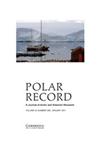S. A. Andrée’s understanding of Arctic ice drift during his 1897 balloon expedition
IF 1.6
4区 环境科学与生态学
Q3 ECOLOGY
引用次数: 0
Abstract
Abstract The tragic Andrée balloon expedition of 1897 serves as a haunting reminder of the dangers posed by ice drift during polar exploration. This paper examines Andrée’s initial decision after his balloon flight to march towards Cape Flora in Franz Josef Land, despite its much greater distance compared to the Sjuøyane archipelago. The rationale behind this choice remains unclear, but potential factors include stored supplies, the demonstrated winter survival in Franz Josef Land and the scientific interest in unexplored regions. By analysing historical accounts and employing scenario analyses, this study contributes to a better understanding of Andrée’s perception of ice drift and its impact on their ill-fated journey. The paper explores major forces affecting ice drift, reviews the historical development of understanding ice drift in the area, and presents an analysis of Andrée’s understanding and decision-making. The overall conclusion is that Andrée probably was unaware of the substantial deflection to the right of the direction of the wind that ice drift in the Arctic on average is characterised of due to the Earth’s rotation (the Coriolis effect). Without this deflection, the decision to march towards Cape Flora would have made sense under the assumption of continued northerly winds.S.A.Andrée在1897年的气球探险中对北极冰漂移的理解
摘要1897年安德雷气球探险的悲剧提醒人们极地探险过程中冰漂移带来的危险。本文考察了Andrée在气球飞行后的最初决定,即向Franz Josef Land的弗洛拉角进军,尽管与Sjuøyane群岛相比,弗洛拉角的距离要远得多。这一选择背后的理由尚不清楚,但潜在因素包括储存的物资、弗兰兹约瑟夫地的冬季生存证明以及对未勘探地区的科学兴趣。通过分析历史记录和情景分析,这项研究有助于更好地理解安德烈对冰漂移的看法及其对他们命运多舛的旅程的影响。本文探讨了影响冰漂移的主要力量,回顾了该地区理解冰漂移的历史发展,并对安德烈的理解和决策进行了分析。总体结论是,Andrée可能没有意识到,由于地球自转(科里奥利效应),北极的冰漂移平均表现为风向向右的大幅偏转。如果没有这种偏转,在持续北风的假设下,向弗洛拉角进军的决定是有意义的。
本文章由计算机程序翻译,如有差异,请以英文原文为准。
求助全文
约1分钟内获得全文
求助全文
来源期刊

Polar Record
环境科学-环境科学
CiteScore
1.40
自引率
25.00%
发文量
26
审稿时长
>36 weeks
期刊介绍:
Polar Record is an international, peer-reviewed scholarly periodical publishing results from a wide range of polar research areas. The journal covers original primary research papers in the humanities, social sciences, physical sciences, life sciences, and polar technology, as well as papers concerning current political, economic, legal, and environmental issues in the Arctic or Antarctic. Polar Record endeavours to provide rapid publication, normally within nine months of initial submission.
 求助内容:
求助内容: 应助结果提醒方式:
应助结果提醒方式:


